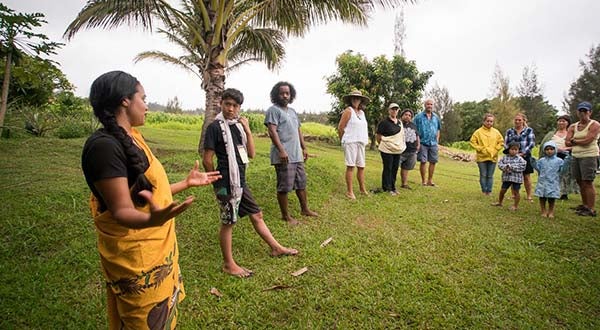Applying indigenous and Western knowledge to environmental research
New project partners Native American students, tribal communities, and Western Earth system scientists
Nov 3, 2016 - by Staff
Nov 3, 2016 - by Staff
*** As of Jan. 24, 2025, Rising Voices is no longer supported by UCAR and NSF NCAR.
November 3, 2016 | Native American researchers, students, and community members will partner with Western science organizations to help shape mutually beneficial research projects as part of a two-year National Science Foundation grant awarded recently to the University Corporation for Atmospheric Research. UCAR manages the National Center for Atmospheric Research (NCAR) under sponsorship by NSF.
The project marks a milestone in collaborations between NCAR|UCAR and Native American partners to increase the presence of indigenous perspectives and participants in geoscience research. It also comes at a time when indigenous people are among the hardest-hit by climate change, with several communities forming America's first wave of climate refugees.
Aimed at building research partnerships between Native American and Western scientists, the NCAR|UCAR project has two supporting goals: broadening career paths for Native American students interested in Earth system science, and increasing the cultural sensitivity of Western scientists. Other partners in the project include the NCAR-based Rising Voices program, Haskell Indian Nations University, the University of Arizona's Biosphere 2, Michigan State University, and the GLOBE citizen science program conducted by the UCAR-based Global Learning and Observations to Benefit the Environment.
"It's an exciting opportunity for both young indigenous scientists and scientists at NCAR and Biosphere 2," said Carolyn Brinkworth, NCAR director of Diversity, Education, and Outreach, and principal investigator of the project. "It's also a very different way of thinking about the science - truly integrating indigenous and traditional Western practices to benefit all of our partners."
For example, she noted, indigenous communities can contribute important information about climate change by bringing generations of knowledge and experience with resource management and environmental and ecological processes.

Students attending the Rising Voices workshop in Waimea, Hawaii, in 2016, visited a food garden planted according to traditional Hawaiian techniques to learn about climate change and phenology – the study of the seasonality of plants and animals. (Photo courtesy Craig Elevitch.)
The pilot project is one of 37 awarded nationwide as part of a new NSF program called INCLUDES (Inclusion across the Nation of Communities of Learners of Underrepresented Discoverers in Engineering and Science). The program aspires to make careers in science, technology, engineering, and mathematics (STEM) more accessible to underserved populations.
Two students from tribal colleges and universities will be selected to become interns in UCAR's SOARS program (Significant Opportunities in Atmospheric Research and Science). The students will join research teams comprised of mentors from NCAR, Biosphere 2, and their home communities to co-develop their research projects.
One of the project partners, the four-year-old Rising Voices program, has brought social and physical scientists and engineers together with Native American community members to build bonds that lead to research collaboration.
"The INCLUDES project will actualize many topics we've been talking about in Rising Voices," said Heather Lazrus, an NCAR environmental anthropologist and Rising Voices co-founder. "The project will create a pathway for the students to become engaged in atmospheric sciences at a young age through a citizen science component, and then help keep them engaged for the long haul.”
The GLOBE citizen science component will help the SOARS students reach out to their communities through a number of activities, especially with middle- and high-school students. The project also will connect community youth with undergraduate programs at Haskell and the University of Arizona.
As it does for all its interns, SOARS will provide multiple mentors to help the Native American students develop their research, computer modeling, scientific communication, and professional skills.
SOARS Director Rebecca Haacker said the internship program has brought in students from Haskell before. “But this will enable us to expand our relationship with indigenous students, and it's nice to see the student internships being part of this larger effort.”
The mentors will be supported with cultural training by Michigan State University professor Kyle Powys Whyte, who is also a member of Rising Voices. "We don't want a situation of Western scientists working with Native Americans without any preparation," Brinkworth said. "We want the Western scientists to be introduced to the students' culture, their ways of thinking, their ways of working."
The plan is for two SOARS interns to be selected by early 2017 and participate in research projects over the summer. In a second phase, NSF plans to bring together all the pilot projects two years from now with the goal of building out a comprehensive “Alliance” program.
Brinkworth said that when she saw the request for proposals, she thought NCAR was uniquely positioned, in part because of Rising Voices, which has strengthened relationships among participating scientists and Native American communities.
She hopes the new pilot project and the lessons to be learned will become a template for other efforts. "We are trying to produce a model for other Western scientific organizations that want to partner with indigenous scientists and communities," she said.
Writer/contact
Jeff Smith, Science Writer and Public Information Officer